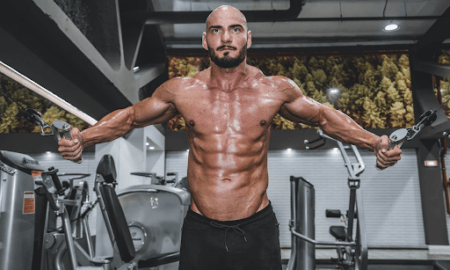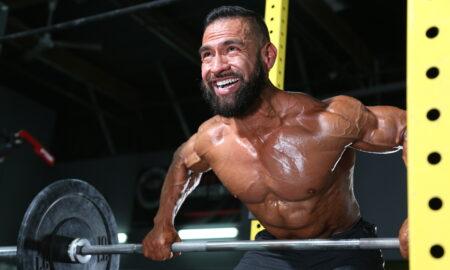The first time I heard the name Arnold Schwarzenegger was in 1966 at Gold’s Gym in Venice, California. The person who told me about Arnold was Chet Yorton, the winner of that year’s NABBA Mr. Universe. Chet had beaten Arnold for the title but was astonished by the size of the 19-year-old giant, especially his arms. Chet felt that Arnold would be the next superstar’in retrospect Chet’s all-time understatement.
Two years later I was talking with Vince Gironda at his gym in Studio City when the biggest bodybuilder I’d ever seen walked into the gym and introduced himself in a very heavy Austrian accent: “I am Arnold Schwarzenegger, Mr. Universe.” Arnold was about 255 pounds, the heaviest he’d ever be in his bodybuilding career. Not cut but monstrous. Vince slowly took the unlit cigar that he’d been chewing on out of his mouth and made a statement that would change Arnold’s physique forever: “You just look like a fat f#@$ to me.”
Always a champion of cutting wit and cut muscle, Vince instantly burst Arnold’s monster complex. For a moment Mr. Universe was stopped dead in his tracks, but he immediately extended his hand to Vince. Arnold’s body would never be that smooth again. Most bodybuilders would have simply left the gym in disgust and anger, but Arnold had the intelligence to recognize immediately that Vince’s ‘tough love’ attitude concealed a hidden truth that he could use. And he did use it. Years later I discussed that meeting with Arnold, and he explained that his only interest up to that time had been to get even bigger. Vince’s brutal assessment helped Arnold clarify his vision of his physique, and it changed the way he prepared for competition.
Arnold had a unique take on prepping for contests. He followed a 12-month plan from one Olympia to the next, each year spending up to nine months specializing on the bodypart he considered his weakest so he could be confident that it would get the concentration of work and energy it needed. He believed that a bodybuilder is judged on his weak points, not his strong points, and said to me many times, “You can only specialize on one thing at a time.”
Over the years he concentrated on both calves and abs. His plan was broken down into four parts, the first, from October through December, being the recovery and regeneration, or “unplanned,” stage playtime in the gym, with no set schedule. It was the time for the body to recover and the mind to create the “want” to do it again in January. Arnold always carefully nurtured the “want,” which he said is what creates the will. Without the will (power), the workout can’t achieve the necessary focus and intensity.
For the next three months, January through March, Arnold would train like a powerlifter/bodybuilder. He used the basic exercises, relatively low sets and no more than four workouts per week. Sometimes he trained his whole body three times in a week, and sometimes he split his routine into an upper-body workout and a lower-body workout, training each bodypart twice a week. His workouts would take 75 minutes at most. He used more rest between sets and always tried to handle more weight’concentrating, of course, on his weakest bodypart two to three times per week.
During the third stage, April through June, Arnold would switch to a six-days-a-week program, working each bodypart twice a week. Those workouts would take 90 minutes to two hours each and would incorporate his specialization work.
The final three months, July through September, would be pure contest prep. He ramped up the intensity and duration till he was training twice a day, working each bodypart three times per week using an a.m./p.m. split. His training time was two to three hours total each day.
Before anyone talked about periodization, Arnold was doing it. Though he always trained very hard, he understood that no one could train with high-set workouts year-round, and he continued to increase the number of sets and exercises he did as well as his time in the gym throughout the nine-month cycle. During those last three months he limited his rest between sets to what his training partner needed to finish his set. That nonstop workout and a scrupulous diet enabled him to achieve very low bodyfat with no cardio at all’something other bodybuilders might think about.
One of Arnold’s greatest mental skills is his ability to focus on one thing at a time, and when he was in the gym he was absolutely focused on the workout. One time we were doing dumbbell curls together, and after my set I mentioned how many more sets we had to go. He stopped me as I finished the sentence: “We don’t have x sets to go but only the set we are working on.” Arnold trained one rep at a time, never wasting mental energy on anything except the rep he was doing. He completely understood the fact that energy is finite and that for him to reach his goals, he had to completely control it.
After the workout he’d never discuss it—it was over, he’d done his best, and that was it. Many bodybuilders complain about the pain and rehash the workout endlessly with their buddies, something Arnold saw as counterproductive. Some guys in the gym would come in complaining about the workout to come, how difficult and painful it would be. Arnold, a natural philosopher who could define what was important to him and then be relentless in his quest to accomplish it, would shout at them, “If you don’t enjoy the workout, find yourself something else to do because you will never be a great bodybuilder without loving it.” Arnold loved the process and still does, and the advice he shouted out 30 years ago applies today to every workout we do. ALL Don’t get me wrong, Arnold could be a sympathetic ear but only up to a point. If you continued to have a negative attitude about training and life, you simply disappeared from his circle. Arnold helped and continues to help people in such events as the Inner City Games and Special Olympics, but only if they try to help themselves. He realized that habitually negative people eventually poison everyone around them, and he chose to keep his vision on the horizon, always with a plan in place. You can talk about genetics, but in fact his attitude, intelligence and focus are what distinguish Arnold from every great bodybuilder in history.
* * *
During the last six weeks before the ’75 Mr. Olympia, when he was filming Pumping Iron, I trained with Ed Corney and Arnold. I was the third man, never on camera because I wasn’t competing in anything, just a workout partner having fun. That intense six weeks I was Arnold’s houseguest at the time gave me a really clear view of Arnold’s character. On the surface this was the most stressful time in his life, but you wouldn’t have known it from his demeanor. What had worked for him in the past’the focus, intelligence and unlimited want translated into a screen debut that captivated a worldwide audience and launched Arnold the movie star.
I was much too close to the situation to really grasp the magnitude of what he’d done and where he was going. He’d been approached by various movie people who saw some potential in him but thought he needed to change his name because no one would be able to spell or remember it. He asked my opinion, and I gave him what I thought were the pros and cons of changing it. As we talked, however, it became apparent that he’d already made up his mind. He then said something that I thought was a joke: “Eventually, there will be only one Arnold, and they won’t need to be able to spell Schwarzenegger.” The rest is history.
* * *
My first-ever limo ride was with Bob Rafelson and Arnold in New York. I always knew Arnold was a bodybuilding star (even I understood that) but Bob, the director who cast Jack Nicholson in Five Easy Pieces, was not part of our very insular world. As we were riding down Broadway, he said with great conviction and enthusiasm that Arnold would be a big movie star. If I hadn’t been sitting down, I would have fallen down. I had a difficult time imagining Arnold out in the real world.
Fast-forward to Bob’s film Stay Hungry, which was shot in Alabama with Arnold in a primary role. Here was Arnold, the acting rookie, with consummate professionals Sally Field and Jeff Bridges. “I’m starting all over again,” Arnold told me. “I am going from the best bodybuilder in the world to a rank beginner.”
Nevertheless, Arnold demonstrated that he was up to the challenge of reinventing himself, winning a Golden Globe award as a newcomer for his performance in that film. Incidentally, he invited virtually all of his bodybuilding friends to be extras in the movie. It was a great time.
After that success Arnold got an offer to star in Conan the Barbarian, but at the time he gave me another piece of bankable wisdom: “You only get excited after the check clears.” He was so right; it took almost two years from the date of the offer till the filming started. During that time I accompanied Arnold to various prisons in California, where he would give training advice and seminars, as well as pep talks on how the prisoners could get on with their lives successfully. There was no news crew, no publicity, just Arnold giving his time and stretching out a helping hand. He reinvented himself again with The Terminator, not just a hit movie but a worldwide phenomenon. I won’t continue going through his movie career, but let me say that his ability to stay hungry and constantly ratchet himself upward to a higher level of accomplishment is unmatched.
In a cover story on Arnold that appeared in a 1988 issue of IRONMAN, Steve Holman asked him about his political aspirations, especially the governorship of California. I’d suggested that question because Arnold had often talked about politics as his next step after the movies. While his answer was noncommittal, he was thinking about it, and on October 7, 2003, it became a reality.
The day before Arnold announced his plans to run for governor, I asked him why he would take on such a daunting task. He said that if he ran, it would be because California and the United States had given him the opportunity to be what he has become and that he felt that he could make a difference, contribute to positive change. He did not tell me that he was running; I can’t say whether he knew himself at that time.
It has been an incredible ride, and along the way Arnold has had the courage, focus and intelligence to make the right decisions. The governorship of California is the beginning of what looks to be Arnold’s greatest chapter of accomplishment. Sacramento, California’s capital city, has never experienced the combination of attributes that Arnold has’from his boundless energy to his ability to call presidents Bush, senior and junior, to his media savvy. He’ll shine a light on Sacramento in a way that takes no prisoners. In his acceptance speech California’s new governor-elect vowed to not fail and not let the voters down. With Arnold that’s not campaign rhetoric but an unshakable promise. IM
During the weeks leading up to Arnold’s election, I had many calls from the press, including the Los Angeles Times, Orange County Register and Sacramento Bee. I probably spent a total of 10 hours on the phone with reporters. It was an eye-opening experience. I was under the na’ve impression that the job of the press was to give the voters a balanced view of the candidates. It was apparent that both the Orange County Register and the L.A. Times had a not-so-hidden agenda. The Times is in general a liberal paper, and the Register is decidedly conservative. Arnold was too Republican for the Times and not Republican enough for the Register. Neither appeared to be interested in balance, and their questions were always trying to lead me to confirm their prejudices. Those reporters didn’t actually know him, but they had preconceived notions that a bodybuilder/actor just couldn’t handle the job of governor. After several hours of conversation over a couple of days one of the reporters admitted that his editor wanted a negative story. I could tell he didn’t like doing it, but at least he had the courage to tell me the real agenda. Not one reporter asked any questions about Arnold’s longtime commitment to the Special Olympics or his backing of the Inner City Games. Not one asked me about his commitment to the holocaust Museum of Tolerance at the Simon Wiesenthal Center in Los Angeles. Many, many people who have a lot of money give it, but Arnold commits not only money but also his and his wife Maria Shriver’s time to these projects. No matter how much money or fame we have, we’re all limited to a 24-hour day. Arnold and Maria give of that priceless commodity. Interested solely in negative buzz that was public knowledge, most of the media representatives I talked with during the campaign didn’t pick up on that very powerful character trait. Only the Sacramento Bee was balanced in its assessment of Arnold the candidate. The other newspapers just wanted me to validate their assumptions. J.B.




















You must be logged in to post a comment Login